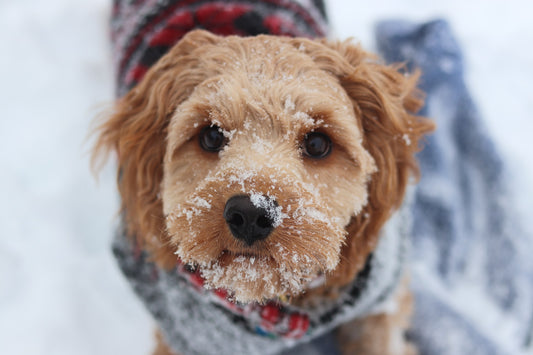As the seasons change and the weather gets colder, it is common to see shifts in the condition of animals with chronic conditions. Even if there are not big temperature shifts where you live, weather changes are still important since even small changes in the temperature can dramatically affect some animals. By anticipating and noticing when the winter weather may affect your pet, you can make changes in diet and routine to help them remain stable during the winter season.
"Cold" pets who seek warmer temperatures, sleep in a tight ball or under blankets, sleep in front of the fireplace or heat vent, drink little, and rarely pant may have a Yang Deficiency or excess Cold which may worsen during this season.
Pets that are "hot" may actually improve and feel better during the winter. Hot animals are those who generally seek cooler temperatures, pant excessively, sleep on cold tile floors or outside where it's cooler, and love to sit in front of the fan or air conditioner. These animals may have a Yin Deficiency or excess Heat.
Any animal can be affected by cold weather when there is an imbalance in the body and the resulting medical condition can vary greatly, so being aware of these shifts is beneficial.
5 Common Conditions that May Worsen in Winter
1. Arthritis: Arthritis is one of the most common conditions that may get worse during the winter, depending on the underlying pattern. Cold and Damp can enter the joints, causing more stiffness, worsening joint pain, and decreased mobility for some pets, especially those with a Kidney Yang Deficiency. You may already recognize that your pet’s arthritis is worse in the summer or winter, making it easier to anticipate and treat this seasonal change.
2. Kidney Disease: Pets with a Kidney Yang Deficiency pattern of kidney disease may get noticeably worse during the winter. Their bloodwork may show worsening BUN and creatinine values, they may develop ascites (fluid in the abdomen), or they may have worsening clinical signs, such as weakness or decreased appetite.
3. Heart Disease: Pets in congestive heart failure may be affected by the colder weather because of their Heart Yang Deficiency. They may be more likely to have worsening fluid build-up, exercise intolerance, weakness, or decreased appetite.
4. Gastrointestinal Disease: With colder temperatures, pets with chronic gastrointestinal disease from a Spleen Yang Deficiency may develop diarrhea (especially in the morning), decreased appetite, or weakness. In addition, pets who have a Spleen Yang Deficiency without underlying gastrointestinal disease may also develop these same clinical signs during the winter, even if they have not shown these signs previously.
5. Respiratory Disease: Pets who have an upper respiratory condition from Cold or Wind-Cold can have increased nasal discharge or congestion, sneezing, or coughing during the colder winter weather.
To help pets prone to worsening conditions in the winter, it can be helpful to increase the frequency of their acupuncture treatments prior to their clinical signs getting worse, or to add other modalities to their treatment plan such as moxibustion (warming the acupuncture needles), chiropractic treatment, or massage.
Foods that help warm the body in winter include venison, lamb, goat, chicken, pheasant, oats, white rice, ginger, pumpkin, and sweet potato. Food should be fed warmed to ease the process of digestion. Animals who tend to be cold should be offered warm beds, blankets, and sweaters if they will tolerate them. Limit time spent outdoors in cold, damp weather.


